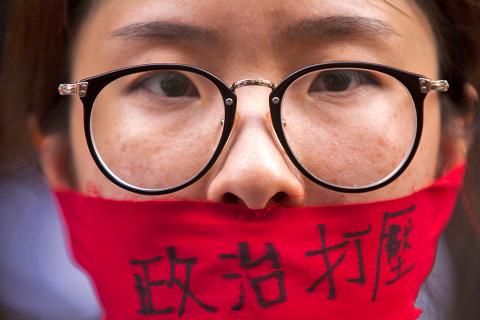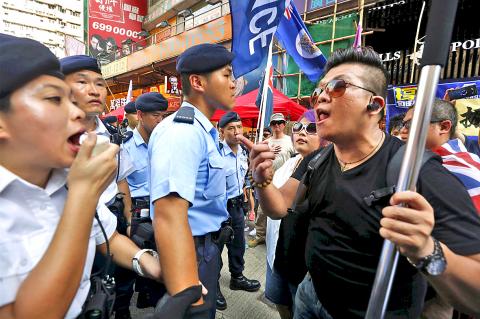Tens of thousands of protesters yesterday joined a pro-democracy march in Hong Kong, the anniversary of the territory’s handover to China, in what organizers described as an opportunity to work out the movement’s next step.
Crowds gathered in Victoria Park in the afternoon, many carrying yellow umbrellas — a symbol of the democracy movement — before marching to the government’s offices in central Hong Kong.
“The most important thing is to express disapproval to the Hong Kong and Chinese communist government for suppressing the freedoms of Chinese people and real elections for Hong Kong people,” protester Wong Man-ying, 61, said.

Photo: EPA
“Things are quickly transforming to fit a Chinese model,” office clerk Anna Cheung added. “We need Beijing to hear our voices.”
The march’s organizers, Civil Human Rights Front, said the turnout was 48,000, lower than in previous years, after almost 12 months of rallies in the territory.
Last year’s march saw huge crowds gather as discontent surged over restrictions by Beijing on how Hong Kong would choose its next leader, and organizers said a record 510,000 attended.

Photo: EPA
“Momentum has slowed down after the veto over political reform,” Civil Human Rights Front’s Johnson Yeung (楊政賢) said, but he insisted turnout numbers this year were not important.
Instead the march was a chance to reshape the message of the democracy movement, he said, which has splintered since the end of the mass rallies in December last year.
“Right now people are asking: ‘What next?’ after the veto,” Yeung said. “We hope the march can set the political agenda and give citizens a chance to discuss how to bring the democratic movement forward.”

Photo: Reuters
Political groups set up stalls and addressed the crowds on loudspeakers while protesters fanned themselves in the oppressive heat.
In a speech at a ceremony for the handover anniversary, Hong Kong Chief Executive Leung Chun-ying (梁振英) criticized lawmakers who rejected the reform package, using instability in Europe to argue that other issues should now take precedence over democratic reforms.

INVESTIGATION: The case is the latest instance of a DPP figure being implicated in an espionage network accused of allegedly leaking information to Chinese intelligence Democratic Progressive Party (DPP) member Ho Jen-chieh (何仁傑) was detained and held incommunicado yesterday on suspicion of spying for China during his tenure as assistant to then-minister of foreign affairs Joseph Wu (吳釗燮). The Taipei District Prosecutors’ Office said Ho was implicated during its investigation into alleged spying activities by former Presidential Office consultant Wu Shang-yu (吳尚雨). Prosecutors said there is reason to believe Ho breached the National Security Act (國家安全法) by leaking classified Ministry of Foreign Affairs information to Chinese intelligence. Following interrogation, prosecutors petitioned the Taipei District Court to detain Ho, citing concerns over potential collusion or tampering of evidence. The

‘FORM OF PROTEST’: The German Institute Taipei said it was ‘shocked’ to see Nazi symbolism used in connection with political aims as it condemned the incident Sung Chien-liang (宋建樑), who led efforts to recall Democratic Progressive Party (DPP) Legislator Lee Kun-cheng (李坤城), was released on bail of NT$80,000 yesterday amid an outcry over a Nazi armband he wore to questioning the night before. Sung arrived at the New Taipei City District Prosecutors’ Office for questioning in a recall petition forgery case on Tuesday night wearing a red armband bearing a swastika, carrying a copy of Adolf Hitler’s Mein Kampf and giving a Nazi salute. Sung left the building at 1:15am without the armband and apparently covering the book with a coat. This is a serious international scandal and Chinese

Seventy percent of middle and elementary schools now conduct English classes entirely in English, the Ministry of Education said, as it encourages schools nationwide to adopt this practice Minister of Education (MOE) Cheng Ying-yao (鄭英耀) is scheduled to present a report on the government’s bilingual education policy to the Legislative Yuan’s Education and Culture Committee today. The report would outline strategies aimed at expanding access to education, reducing regional disparities and improving talent cultivation. Implementation of bilingual education policies has varied across local governments, occasionally drawing public criticism. For example, some schools have required teachers of non-English subjects to pass English proficiency

NEGOTIATIONS: The US response to the countermeasures and plans Taiwan presented has been positive, including boosting procurement and investment, the president said Taiwan is included in the first group for trade negotiations with the US, President William Lai (賴清德) said yesterday, as he seeks to shield Taiwanese exporters from a 32 percent tariff. In Washington, US Trade Representative Jamieson Greer said in an interview on Fox News on Thursday that he would speak to his Taiwanese and Israeli counterparts yesterday about tariffs after holding a long discussion with the Vietnamese earlier. US President Donald Trump on Wednesday postponed punishing levies on multiple trade partners, including Taiwan, for three months after trillions of US dollars were wiped off global markets. He has maintained a 10 percent